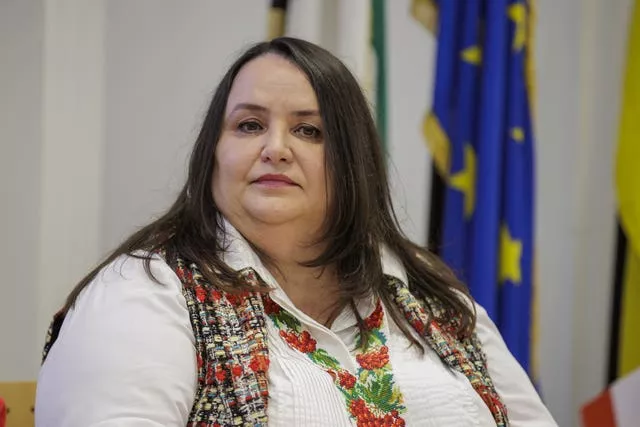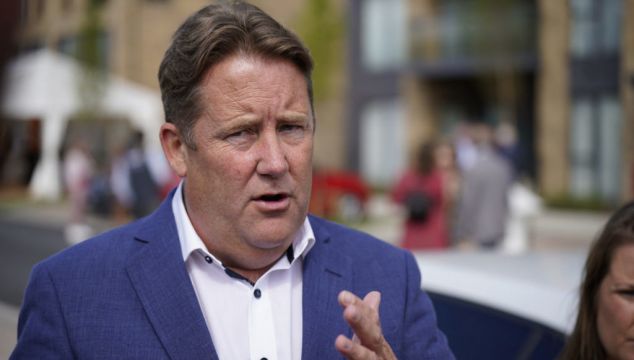Minister for Housing Darragh O'Brien would not clarify whether he expected homeless figures to rise in response to the cut to support for Ukrainian refugees arriving in Ireland.
The Minister said that the Government is “working as a collective” to house Ukrainian refugees, and admitted that there had been “challenges” to the Government’s response.
The changes, which will come into force at the end of January, will see State accommodation being provided to arriving Ukrainians for a maximum of 90 days, where it had previously been provided without limit.
Speaking to reporters on Friday, Mr O’Brien said: “We’re working as a collective in Government on this.
“I think we’ve got to recognise that between our friends from Ukraine and others who are fleeing persecution that this country has been able to accommodate over 100,000 people in just over a year.
“I think that hasn’t been without its challenges. But that really speaks to the welcome that Ireland has given to people who are seeking safe and secure harbour here as well.“We’ll be working with our colleagues and we continue to do that to ensure that all the supports our local authorities can give are given.
“We work on a daily basis there as well. So, “the changes that have been agreed at Cabinet will come forward early next year. We will work with with our colleagues in the Department of Children.”
When asked if he was not as confident as Minister for Children Roderic O’Gorman, who said that homeless figures would not rise, he said: “Changes haven’t come in.
“It’s our job to provide accommodation where we can for everyone who seeks it, and that’s our main focus.”
Earlier, Ukraine’s ambassador to Ireland said she understands the Government’s decision to cut support for people fleeing Russia’s invasion.
The Government has provided State accommodation to Ukrainians arriving in Ireland for an unlimited amount of time, and a weekly social welfare rate of €220 a week, since the war broke out in February 2022.
Last week ministers agreed that from the end of January, State accommodation will only be provided for up to 90 days.
During that period, arrivals will be paid a €38.80 subsistence allowance and an additional €29.80 per child per week; once they leave state accommodation they are entitled to apply for social welfare.
No changes are being made for the 100,000 Ukrainian nationals who are already living in Ireland.
Ukrainian ambassador to Ireland Larysa Gerasko said that while she understood the decision, she has concerns about what will happen to Ukrainian nationals after the 90 days.
“I’m fully aware about the housing crisis and the shortage of accommodation for Ukrainians, and not only Ukrainians,” she told RTÉ Radio.
“I understand this decision. I have, of course, my concerns as well, because in 90 days it would be very difficult to find accommodation for newcomers.”
Asked whether the decision would deter people from coming to Ireland, she said: “I think so, yes.”
She said she had requested the “official” version of the decision from the Department of Foreign Affairs.
“We have to analyse this decision and send appropriate messages to Ukrainians in Ukraine, and recommendations of course.”

She said her embassy would use a variety of ways and do “everything possible” to deliver the information to Ukrainians not just about the 90-day limit, but also about the difficulty in finding accommodation in Ireland.
Announcing the decision last week, Integration Minister Roderic O’Gorman said he expected fewer Ukrainian nationals to arrive in Ireland as a result, but that it would not cause a rise in homelessness.
The Government has said the measures are being taken because of housing supply pressure, and Ireland continues to expect about 500 arrivals per week.
More than 101,200 people have arrived from Ukraine since the Russian invasion began in February 2022, with 74,500 Ukrainians living in state accommodation and 57,000 in fully serviced accommodation.
More than 16,000 are currently in employment, according to Government figures.
Mr O’Gorman said that reception centres would be set up to house people for 90 days, where meals and laundry services would be provided as well as integration support and access to education for children.
He said that the changes would bring the Irish offering “into line” with other western European countries, some of which, he said, had not welcomed as many Ukrainians as Ireland on a proportionate basis.
Government figures indicate that Ireland now hosts 2.3 per cent of all beneficiaries of temporary protection in the EU.







